My Army Recruiter SSG Constantine. He went above and beyond the call of duty to get me to join. I was a hard-headed, troubled teenager.
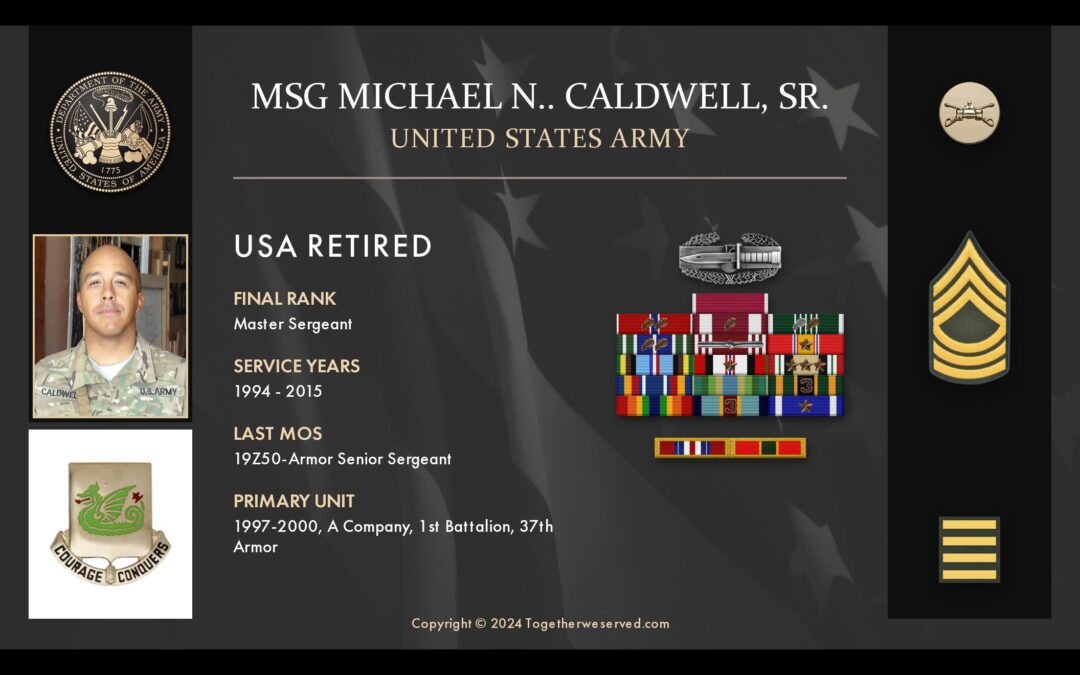

My Army Recruiter SSG Constantine. He went above and beyond the call of duty to get me to join. I was a hard-headed, troubled teenager.
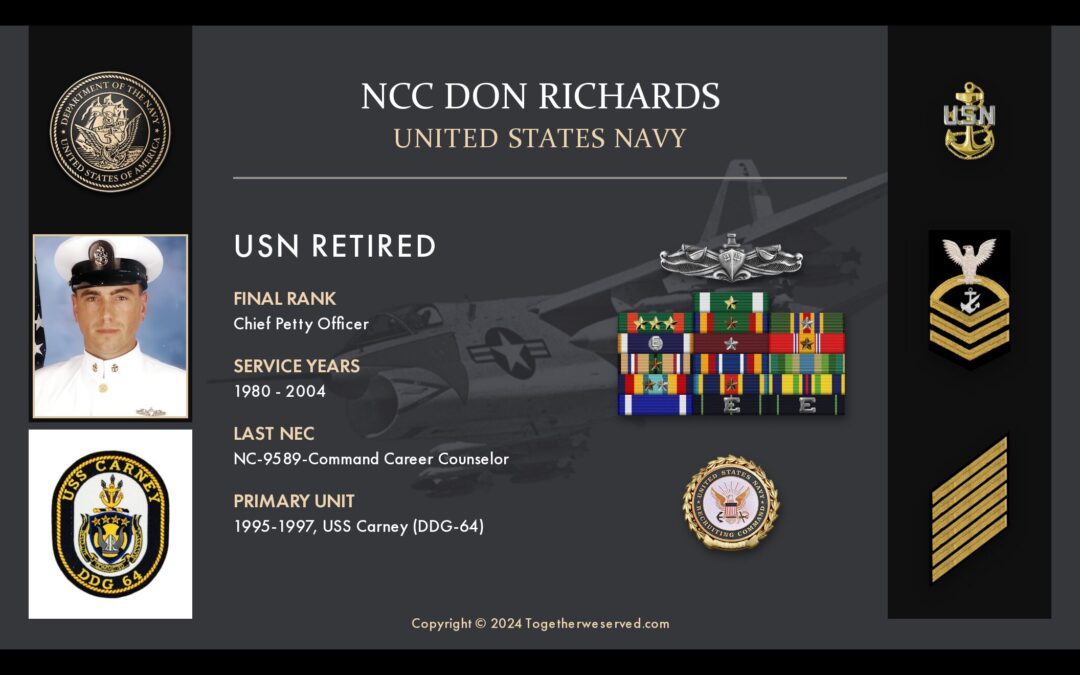
Growing up I was influenced by war movies, TV and history involving the military (and I still am) so; I felt a sense of duty. In 1980 (age 20) I knew I wanted to join but, I wanted some control over what I would be doing. One day I drove to the recruiting office, grabbed some pamphlets and left. I didn’t look at the recruiters or give them a chance to talk to me.
I looked at the material over, talked to my brother-in-law (who was a Navy Vet) and went back a week or so later to negotiate IC “A” school.
When I learned I could be promoted to E2 by referring two others to join; I parked outside the recruiting office almost every day, during lunch. When someone came up I’d ask, “are you thinking about joining the Navy”? If they said yes I’d say “my name’s Don, come on, I’ll introduce ya! The recruiters must have thought I knew everyone in town and at least three of them enlisted (so, since I referred them, I was promoted to E2).

I wish I could say I dreamt of being a Marine since I was a young child, however, that wasn’t the case. In fact, I was well into my senior year at John F. Kennedy Catholic high school before joining the armed services ever entered my mind.
My best friend, Kevin Hendricks, was visiting the local USMC recruiter quite often just to hang out and he asked if I wanted to tag along. It wasn’t long thereafter that I knew the Marine Corps was my ticket out without having to spend 4 more years behind a desk at some faraway college. So it is without a doubt that my recruiter, Sgt Mark Cross was the single most important person who influenced my decision to join the Corps. I’ve heard some real “horror stories” about recruiters but this guy was top-notch and NEVER lied or painted a rosy picture of how things would be in boot camp. For that, I am forever thankful!
In full disclosure, the girls he introduced me to and the beer he bought me didn’t hurt either – Semper Fi, Sgt Cross!

I was an Army brat for 17 years (Dad was career army, West Point graduate). I had two years of Army ROTC in college. I went to the Oakland (CA) recruiting station fully intending on enlisting in Army or Marines. However, I saw the sandwich board sign at the end of the hall advertising the Coast Guard. Went in talked with the recruiter and realized the CG was a natural fit for my interest in having a career in law enforcement or firefighting. Signed up on delayed enlistment in 1975 and have been involved in law enforcement, firefighting, and emergency management since then.
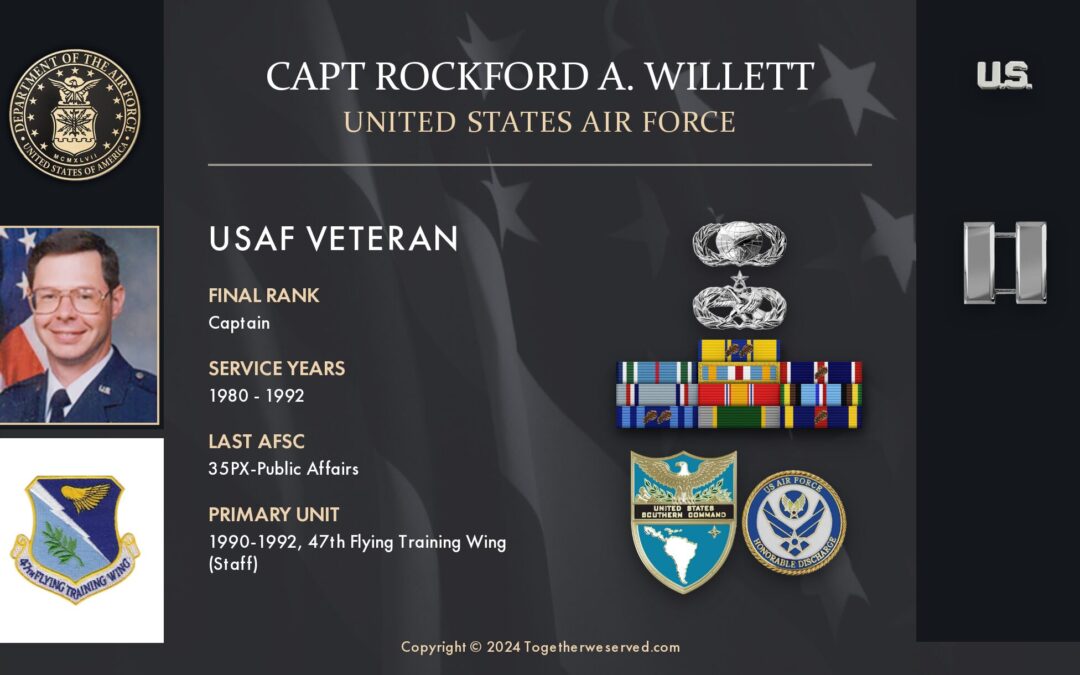
My oldest brother served in the Army from 1964 – 1967 and survived a tour in Vietnam as a combat medic. I figured if he could do that and come back alive, I could do better in the US Air Force. I was married for about 18 months, quit a full-time job to “go back to school,” hated going back to school, and got a job as a “courtesy clerk” at Kroger. Although I had a lot of experience in stage lighting, no jobs were panning out for me in that area. Then I remembered my brother’s experience with the Army and decided to visit an Air Force recruiter and see what it was all about. I still remember the recruiter – TSGT Steiger.
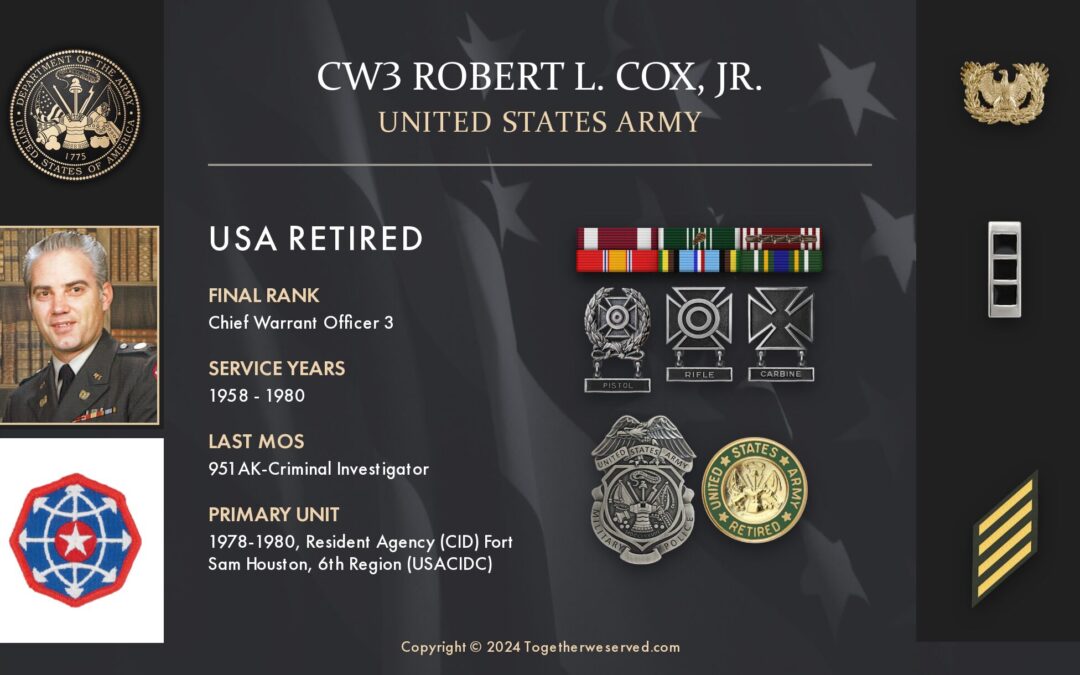
I grew up in a family with a rich military history. My great great grandfather fought in the Civil War but never came home and is presumed dead. My grandfather Anderson was a soldier in WWI and served in France. Five uncles on both sides of the family served in WWII, three in the Army, 1 in the Navy and 1 in the Marine Corps. Two of these uncles made careers in the Air Force that continued from WWII through the Vietnam War. My father served three years in the Army from 1936 into 1939 and then again from 1944 into 1946.
As a youngster, I relished all the war stories and was old enough to keep up with all the news about the Korean War. My friends and I were always playing with toy soldiers and fighting our own wars. At an early age, I started with Cub Scouts then Boy Scouts and loved wearing the uniforms and going to all the Scout Camps. Later I joined the Cadet Division of the Civil Air Patrol keeping a fascination with things military. Perhaps it was a foregone conclusion that I would be in the military, but what branch?
One of the adult members of the Civil Air Patrol was a Texas Highway Patrolman and I became very interested in pursuing law enforcement. By this time I was becoming a senior in high school but you had to be 21 years old to apply to the Texas Department of Public Safety. The military draft was in effect at this time and I determined that the US Army had an excellent Military Police Corps. My plan was then to join the Army after school and spend three years in the Military Police to prepare me for civilian law enforcement and not have to worry about being drafted later to interfere with my goal.
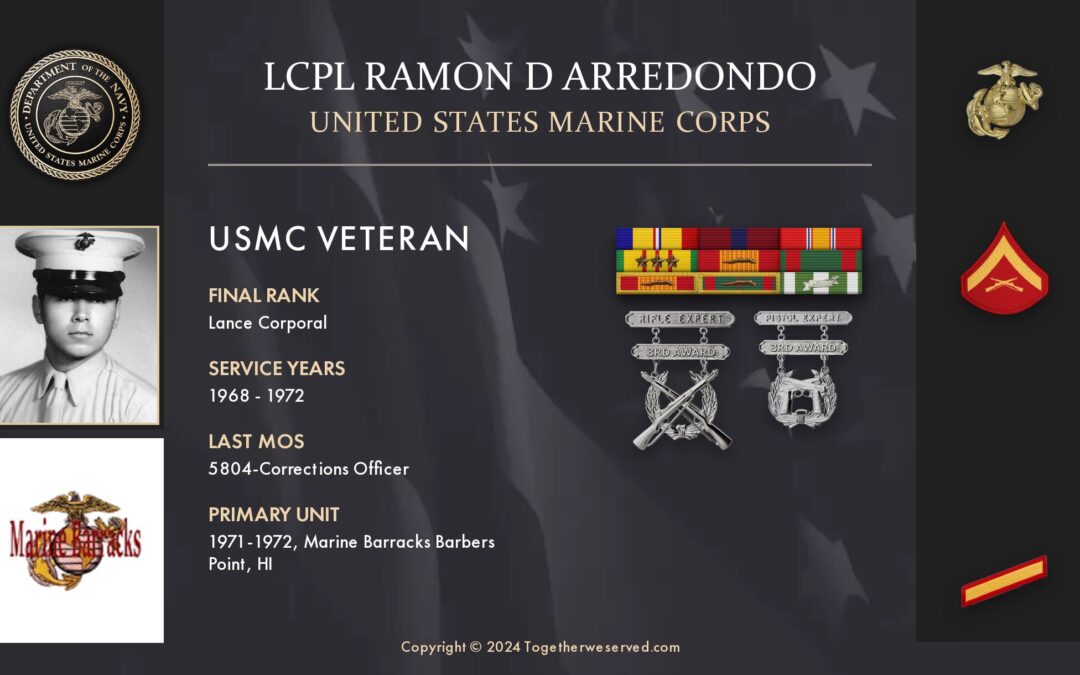
I grew up listening to my dad’s war stories of WW II, fighting in the Pacific against the Japanese. My Dad was, and is my HERO. I wanted to be just like him. Wanting to do my part in the service of this great country. I grew up playing war games with my brothers and cousins in our back yard. Being a military man and of course the dress blues of the USMC that I saw one day in High School. DUTY, HONOR AND GOD, I belonged to JROTC unit in high school. We thought that it was our duty to stop the spread of communism in the world. The dress blues and the challenge of being the best fighting unit in the armed services. I trained as a Marine Sniper. Although when I got in-country, grunts were in need and not snipers. I participated in operation Utah Mesa; lower A Shau Valley search and destroy missions. I ran into an NVA patrol. This was my first firefight. There were 2 NVA KIA’s and 1 wounded. We suffered 1 wounded Marine. This was just one of many patrols that I went on. The Operation continued into Laos. We cut off supplies of the Ho Chi Minh trail. Georgia Tar, Hekiemer Mountain operations.
I would go on patrols and pull convoy duty watching over the SeaBee repairing HWY 1, receiving small arms fire during this encounter! I was sitting atop a hill in the lower Khe Sahn area and looking up at the night sky. The stars made me feel lonely and scared. We had incoming daily from the DMZ rockets, motors, and artillery shelling. It was constant harassment from the NVA. Although not considered to be a major operation, the loss of life tells another story. Operation Utah Mesa came at cost of 145 Marines killed and some 300 wounded. Victory doesn’t come easy, when you are the one looking for the enemy. During the Fall Counter-Offensive we were Heloed into Thua Thein Province near the Loation border for search and destroy. The operation took about 3 weeks in December of 1969. Here we encountered light enemy fire, but we captured rice, a small arms stash and disrupted the enemies supply line. Semper Fi’ MY EXPERT BADGE and SNIPER Qualification AND MY Combat Action Ribbon for the fire fights I participated in, were a true test of your metal and the Viet Nam Cross of Gallantry Medal.
Then there was the death of LCpl Seiler, June 27,1969 and the death of two other Marines PFC Huriank and CPL Mc Masters. He, Seiler, was a short timer killed 2 week before rotating back to the states. We had been talking just moments before his death. How precious life really was to us. I spent another two and half years more in the Corps and I got out.
I went back to being a meat ciutter in the private sector and after 16 years, I went to work at DeCA. I became a meat cutter and then into Management for the Defense Commissary Agency at Lackland Air Force Base, and a tour in Holland at an Army Base. It provided me with the drive to succeed. I supervised 20 employees and ran a department that did $4 million in sales a year. Stay the course, be committed, use team work, be dedicated and go for gold!
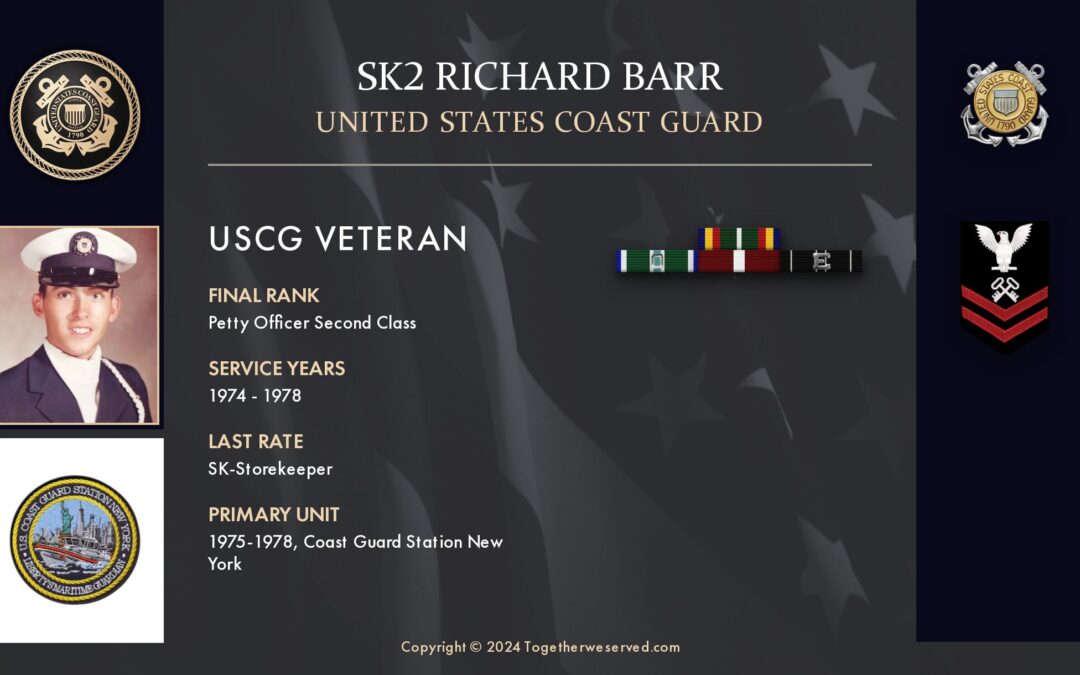
My brother Stan. He had served in the Marines during the Tet and knew about what the Coast Guard was all about and recommend I test for them. Back in ’74, the Coast Guard had higher standards than any other branch. I tested in Louisville, KY and shipped out to boot camp the next day!
There were 7 recruits shipped off to Alameda, CA that day.
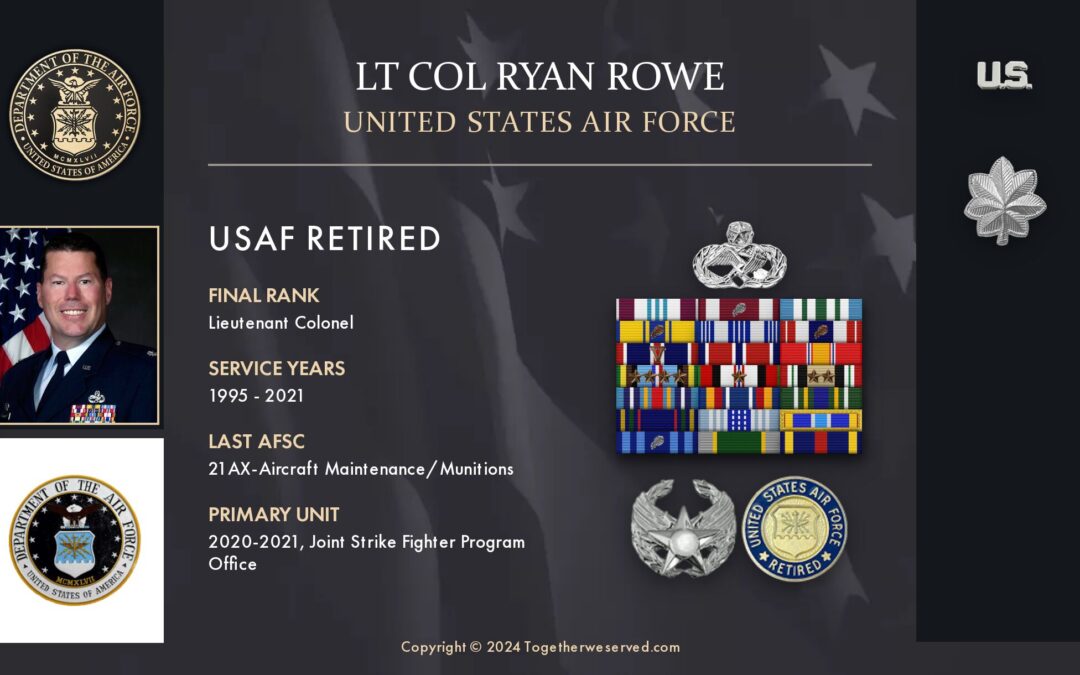
PRESERVING A MILITARY LEGACY FOR FUTURE GENERATIONS The following Reflections represents LT COL Ryan Rowe's legacy of his military service from 1995 to 2021. If you are a Veteran, consider preserving a record of your own military service, including your memories and photographs, on Togetherweserved.com (TWS), the leading archive of living military history. The following Service Reflections is an easy-to-complete self-interview, located on your TWS Military Service Page, which enables you to remember key people and events from your military service and the impact they made on your life. Start recording your own Military Memories HERE. Please describe who or what influenced your decision to join the Air Force. Cadet Rowe I had always had an interest in military things. I was the kid who never stopped playing with GI Joe's! My dad was in the Navy, and I enjoyed his stories. But, in the end, it was a personal decision based on patriotism and wanting to give back. And maybe, also looking...
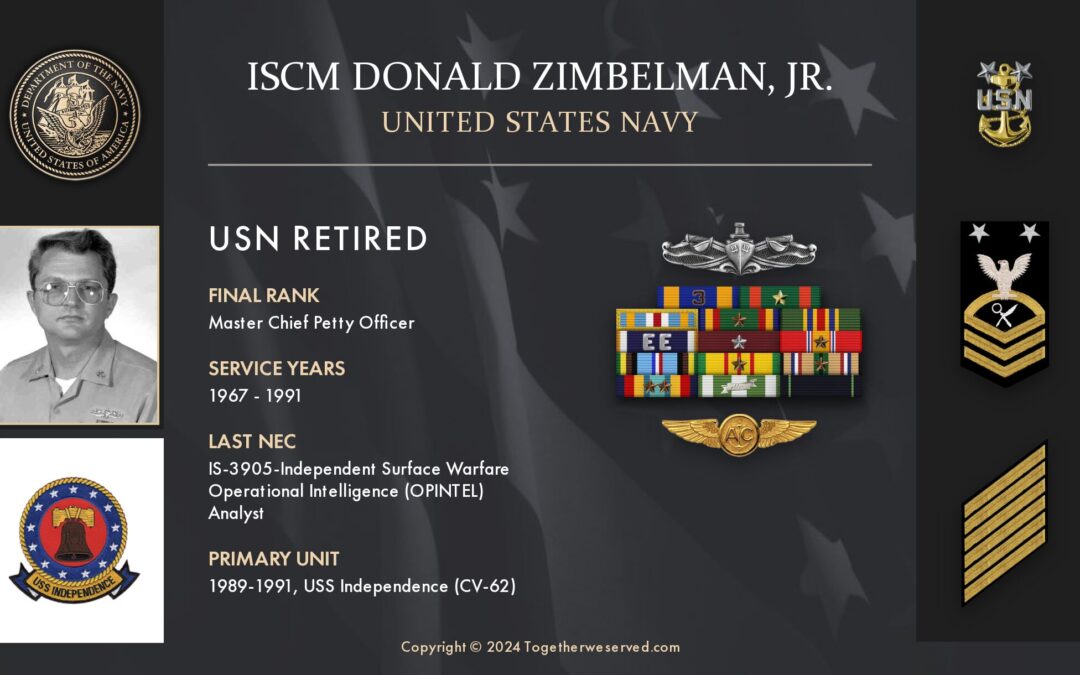
My decision to join the Navy was probably like others who joined, I didn’t want to be drafted into the Army. Also, my dad and several uncles were in the Navy during WW II, and I wanted to follow the military tradition that my family had. I also had an uncle who served in the Army during WW II, and my Grandfather was in the Army during WW I. I was also interested in the Navy and was mesmerized by the battleships and aircraft carriers. I wanted to be a Naval Aviator, which didn’t happen, but I came close as an aircrew member on EC/WC-121s. So, my best friend, Doug Austin, and I enlisted in the Navy and left for boot camp in San Diego on February 1, 1967. We were both tired of school and were looking forward to a change.
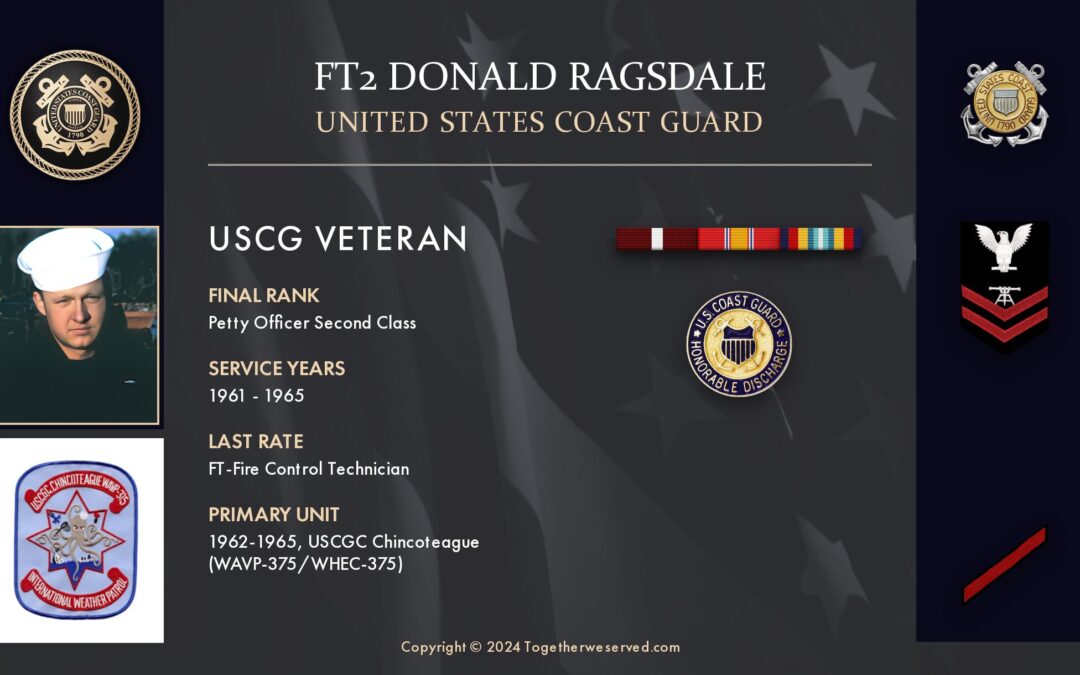
From high school, I had been leaning toward a military career. My high school ROTC instructor didn’t have any information on the Naval ROTC program, but he gave me a booklet about the Coast Guard Academy. I guess you could say that my Coast Guard recruiter was M/SGT Vincent Thomas, USA.
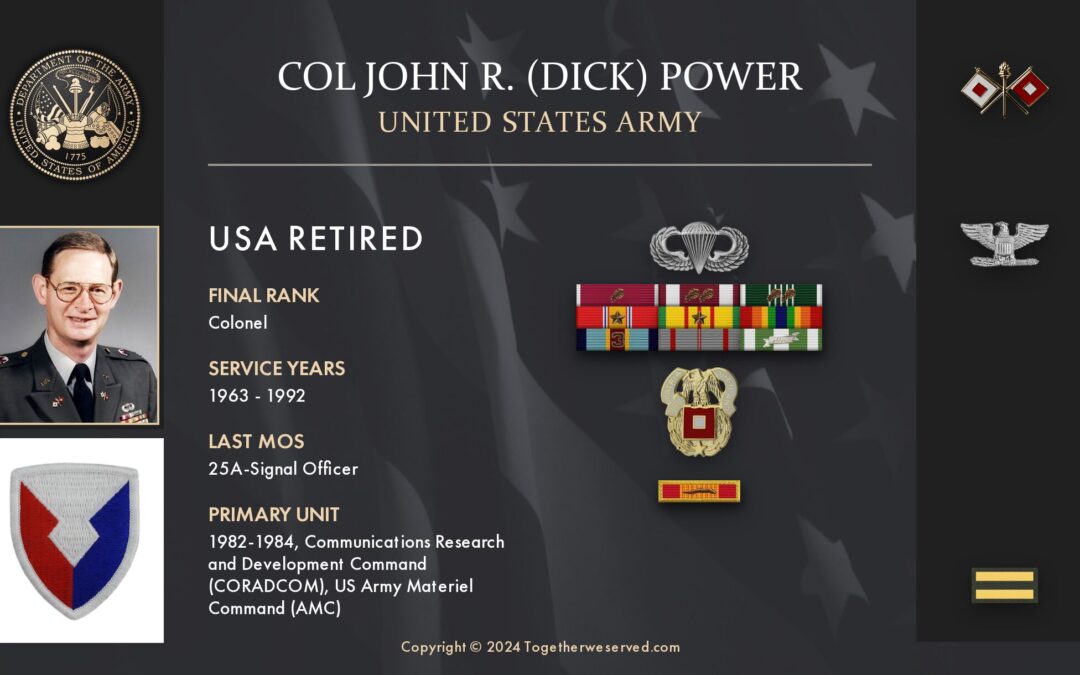
It was straightforward. My father, a WWII veteran who left the Army as a Captain, gave me sage advice. I was about to enter my freshman year in college in 18. There was still a draft. He told me to get into the ROTC program because it was better to serve as an officer than an enlisted soldier. I would not challenge his credibility about this and so on. Unusually for an 18-year-old, I listened to my father. And went on to serve for almost 30 years and retired as a Colonel. I sure wish he had lived to see that!